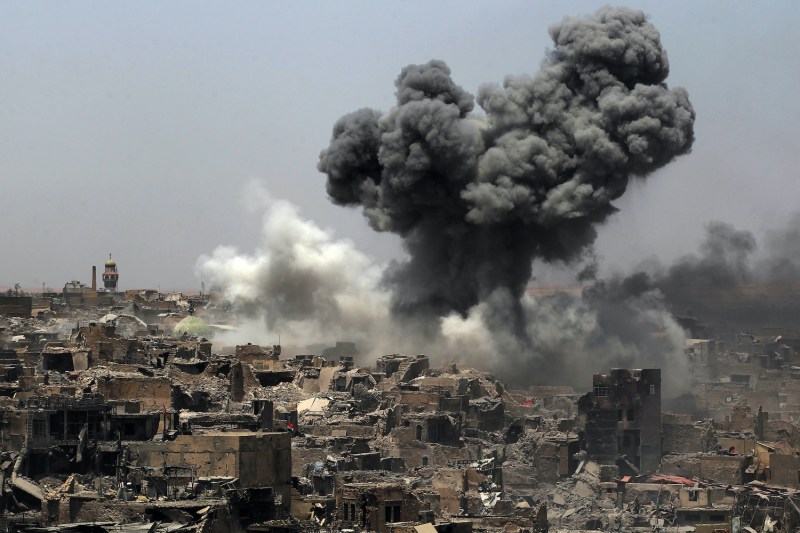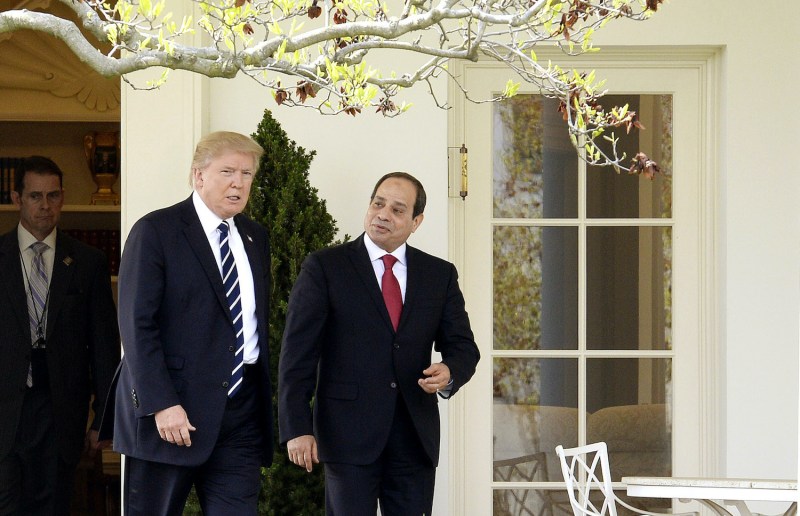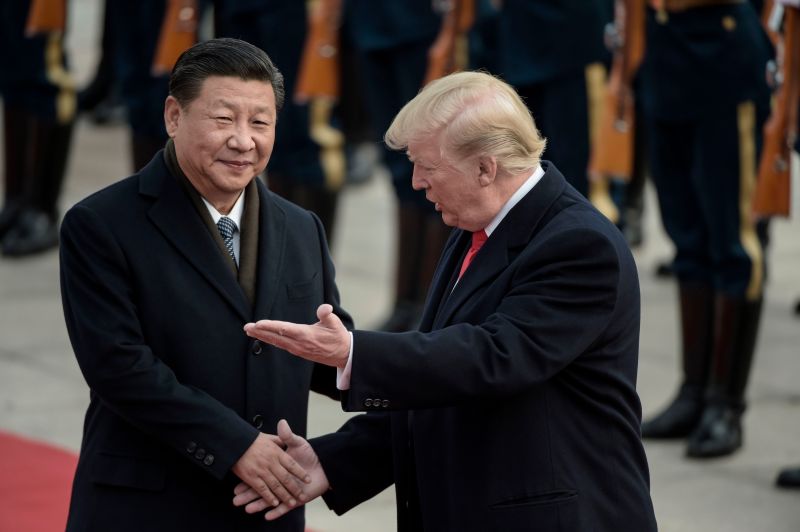The coronavirus has cropped up again among personnel at the only permanent U.S. military base in Africa, Foreign Policy has learned, underscoring the difficulty of containing the pandemic’s spread even as the U.S. Department of Defense attempts to put in place strict social distancing measures for its troops deployed across the continent.
The coronavirus has cropped up again among personnel at the only permanent U.S. military base in Africa, Foreign Policy has learned, underscoring the difficulty of containing the pandemic’s spread even as the U.S. Department of Defense attempts to put in place strict social distancing measures for its troops deployed across the continent.
A contractor who works at Camp Lemonnier in Djibouti and lives nearby—who was preparing to move onto the base in line with a Pentagon request—tested positive for the virus this week. This comes after U.S. forces declared a public health emergency on base last week, according to a statement, a move that gave commanders the authority to repurpose facilities for medical uses and better control the flow of American troops and contractors on and off the base.
This is the second known case at Camp Lemonnier, after another contractor working at the base tested positive for the virus in March, according to the New York Times. The contractor who tested positive this week is asymptomatic and has been placed in isolation under restricted movement.
The U.S. military base in Djibouti is crammed next to French, Italian, Chinese, and Japanese bases, reflecting the geopolitical importance of the tiny East African nation that sits at the mouth of the Red Sea, a key international shipping lane. The base is a launchpad for counterterrorism strikes and anti-piracy operations.
[Mapping the Coronavirus Outbreak: Get daily updates on the pandemic.]
The cases in Camp Lemonnier represent the latest example of the global pandemic’s knock-on impacts on U.S. military posture and operations. The U.S. military has canceled or pared down major military exercises in Europe aimed at deterring Russia, and an outbreak of the coronavirus has left one U.S. aircraft carrier deployed to the Pacific pierside in Guam and rerouted an American destroyer bound to join President Donald Trump’s counterdrug mission in the Caribbean back to the West Coast. U.S. Africa Command also scuttled the massive 9,300-troop, three-nation “African Lion” exercise in March as the Pentagon began to put in place social distancing guidelines for U.S. forces.
Officials and experts fear that terrorist groups in Africa will take advantage of the havoc wreaked by the global pandemic to gain more territory and carry out more attacks. The U.S. military has about 4,400 troops stationed in East Africa, mostly in Djibouti, to advise regional counterterrorism efforts against the Somalia-based al-Shabab terrorist group.
Under the Trump administration, strikes against al-Shabab have surged as the al Qaeda-allied group has openly stated desires to strike the U.S. homeland and installations, raising concerns among military officials. In 2017, the Trump administration declared all of war-torn Somalia an area of hostilities, giving the Pentagon greater authority to call in airstrikes.
The changes have resulted in the Trump administration using a higher volume of defensive strikes to decimate the militant group’s contingent of rank-and-file fighters instead of focusing on the high-value terrorism suspects targeted by the Obama administration, experts say, but it hasn’t stopped the group from launching successful attacks, such as the gunfight with al-Shabab that killed three Americans in Manda Bay, Kenya, in January.
Read More

Smoke billows following an airstrike by the US-led international coalition forces targeting Islamic State (IS) group in Mosul, Iraq, on July 9, 2017.
Smoke billows following an airstrike by the US-led international coalition forces targeting Islamic State (IS) group in Mosul, Iraq, on July 9, 2017.
Pentagon Asks for More Cash to Cut Down Civilian Deaths
Under fire from human rights groups, the Pentagon is asking lawmakers for funding to improve its ability to track civilian casualties in the ongoing fight against the Islamic State and other terrorist groups, Foreign Policy has learned.

U.S. President Donald Trump and Egyptian President Abdel Fattah al-Sisi
U.S. President Donald Trump and Egyptian President Abdel Fattah al-Sisi
After Death of U.S. Citizen, State Department Floats Slashing Egypt Aid
The United States continues sending military aid to Egypt despite its worsening human rights situation. Could the death of a detained American change that?

China’s President Xi Jinping (L) and US President Donald Trump attend a welcome ceremony at the Great Hall of the People in Beijing on November 9, 2017.
China’s President Xi Jinping (L) and US President Donald Trump attend a welcome ceremony at the Great Hall of the People in Beijing on November 9, 2017.
Trump Fixates on China as Nuclear Arms Pact Nears Expiration
The administration insists any future START treaty has to include Beijing as well as Moscow, but experts say there is almost no chance China will agree.
“The bottom line is that U.S. military actions have failed to blunt al-Shabaab’s ability to attack Somalis and international personnel using a combination of asymmetric tactics—including ambushes, IEDs, suicide commando raids, assassinations—and more conventional assaults on forward-operating bases,” Paul Williams, a professor at George Washington University who has long studied the United Nations peacekeeping mission in Somalia, writes in a forthcoming report for the Chatham House think tank seen by Foreign Policy.
The new infections could have overarching effects on operations that have skyrocketed in recent years. U.S. Africa Command recorded 61 strikes in Somalia last year, the highest yearly total during Trump and former President Barack Obama’s administrations. A former Special Operations Command official who spoke with Foreign Policy on the condition of anonymity suggested that the immediate impacts of the declaration would include stemming the flow of supplies onto the base, causing slower rates of resupply, and delaying local contracts in the area. But other officials said that the public health emergency would not get in the way of the delivery of supplies, such as fuel and food, which will continue uninterrupted.
Djibouti has had the highest number of confirmed coronavirus cases in East Africa—1,100—and two confirmed deaths, according to data from the Africa Centers for Disease Control. Djibouti, a relatively closed-off police state, has a highly urbanized population and limited health care infrastructure, making it particularly vulnerable to the pandemic. U.S. officials have urged contractors at Camp Lemonnier—located on the other side of a civilian airport in Djibouti City—to move onto the base full-time for safety precautions. The capital city is home to more than half of the country’s 921,804 people.
But in spite of the fast spread of the pandemic among Djibouti’s surrounding civilian population, no American service members at the base have tested positive for the virus, a spokesman for the U.S.-led task force fighting in the Horn of Africa told Foreign Policy, and officials disputed claims that the base was on lockdown.
“Camp Lemonnier is not on ‘lockdown,’ but beginning Monday, contractors who have not moved onto Camp will be restricted from coming onto Camp for work,” said Capt. Scott Rye, a spokesman for the coalition. “This is a preventive action taken as a force health protection measure.”
About a third of contractors on base have complied with an April 17 order to return in a memo from Maj. Gen. Michael D. Turello, the commander of Combined Joint Task Force-Horn of Africa and Capt. Kenneth Crowe, the Camp Lemonnier commanding officer. The two officers have set a deadline for contractors to move back onto base by May 4.
Yet even with the preventive measures in place and U.S. troops more spread out than on aircraft carriers and Navy ships such as the coronavirus-wracked USS Theodore Roosevelt, commanders on the base will still have to balance keeping their troops at arm’s length with each other with the Pentagon’s demands to keep up the pressure on Somali militants.
“The installation itself is fairly sprawling, but they still live in quarters together, so there’s only so much spreading out they can do, because it’s really hot there,” said Alice Hunt Friend, a former Pentagon official and now a senior fellow at the Center for Strategic and International Studies in Washington. “There’s only so much time you can spend outdoors. Cubicle life is not great for social distancing.”
Source link : https://foreignpolicy.com/2020/05/01/coronavirus-us-military-hub-africa-djibouti/
Author :
Publish date : 2020-05-01 07:00:00
Copyright for syndicated content belongs to the linked Source.





